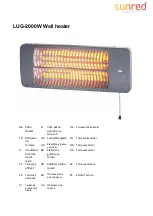
19
MAINTENANCE
Always close the front access door after making a temperature
adjustment. Turn on electricity.
DRAINING
The water heater must be drained if it is to be shut down and
exposed to freezing temperatures. Maintenance and service
procedures may also require draining the heater.
1.
Turn off the electrical disconnect switch.
2.
Close the supply water inlet valve to heater.
GENERAL
Periodically the drain valve should be opened and the water
allowed to run until it flows clean. This will help to prevent
sediment build-up in the tank bottom.
Periodically check the temperature and pressure relief valve to
ensure that it is in operating condition. Lift the lever at the top of
the valve several times until the valve seats properly and operates
freely.
CAUTION
THE WATER PASSING OUT OF THE VALVE DURING THIS
CHECKING OPERATION MAY BE EXTREMELY HOT.
Water heater maintenance includes periodic tank flushing and
cleaning, and removal of lime scale from the heating elements.
Component
Operation
Interval
Required
Flushing
Monthly
-------------
Tank
Sediment
Removal
As needed
-------------
Elements
Lime Scale
As needed
UN•Lime
®
delimer
Removal
and element gaskets,
Part No.5109.
Tank flushing should be performed in accordance with the above
schedule. Tank sediment removal and element lime scale
removal must be performed when needed as determined by
periodic inspections. Following are the instructions for
performing recommended maintenance.
FLUSHING
The water heater drain valve should be opened once a month to
help prevent sediment buildup on the tank bottom.
1.
Turn off the electrical disconnect switch.
2.
Attach hose to outlet opening of drain valve and direct
end to drain.
•
Open the drain valve by turning the knob to the
left (counterclockwise). Allow water to flow until it runs
clean.
•
If water does not flow from opened drain valve,
follow instructions for sediment removal.
3.
When finished flushing:
•
Close heater drain valve and remove hose.
•
Turn on electricity.
SEDIMENT REMOVAL
Water borne impurities consist of fine particles of soil and sand
which settle out and form a layer of sediment on the bottom of
the tank. In time, if not removed, the level of sediment might
reach the heating elements and cause their failure.
For convenience, sediment removal and element lime scale
removal should be performed at the same time as follows.
LIME SCALE REMOVAL
Lime scale accumulations on the heating elements is a normal
condition, common to all immersion type elements. Factors
which affect the amount of this formation are:
1.
Amount of hot water used. As the volume of water heated
increases, more scale results.
2.
Water temperature. As the temperature of water is in-
creased, more scale is deposited on the elements.
3.
Characteristics of water supply. Regardless of water
treatment, the elements should be examined regularly.
Lime scale accumulations may cause noises to occur during
operation.
It is recommended that a heating element be removed
periodically for examination. If it is scaled, all of the elements
should be removed and cleaned. If the tank bottom has an
accumulation of sediment it should be cleaned.
Lime scale should be removed by dissolving the accumulation
in UN•LIME® delimer. UN•LIME is a non-muriatic delimer,
available from A.O. Smith Water Products Company, Product
Service Division, 5621 W. 115th ST., Alsip, IL. 60803. Do not
use muriatic or hydrochloric acid base deliming solutions to
remove lime scale from the elements.
1.
Turn off electrical disconnect switch.
2.
Drain the heater following DRAINING instructions.
3.
Open front access door.
4.
Disconnect the element wiring. Try not to disturb the
wiring unnecessarily and reconnection will be easier.
3.
Attach hose to outlet opening of drain valve and direct
end to drain.
4.
Open a nearby hot water faucet and the heater drain
valve.
5.
If the heater is being drained for extended shutdown, it is
suggested the drain valve be left open during this period.
The hose may be removed.
•
Follow FILLING instructions when restoring hot
water service.
Summary of Contents for DSE-120-24
Page 2: ......
Page 4: ......
Page 6: ......
Page 8: ......
Page 10: ......
Page 12: ......
Page 14: ......
Page 16: ......
Page 30: ...15 SMALLCOMMERCIALWIREDIAGRAM 208 240V 3PH SMALLCOMMERCIALWIREDIAGRAM 208 240V 3 1PH...
Page 32: ...17 SMALLCOMMERCIALWIREDIAGRAM SINGLEPHASE SMALLCOMMERCIALWIREDIAGRAM 300 600V 3PH...
Page 40: ......
Page 41: ...SECTION 2 REPLACEMENT PARTS GUIDE...
Page 42: ......














































